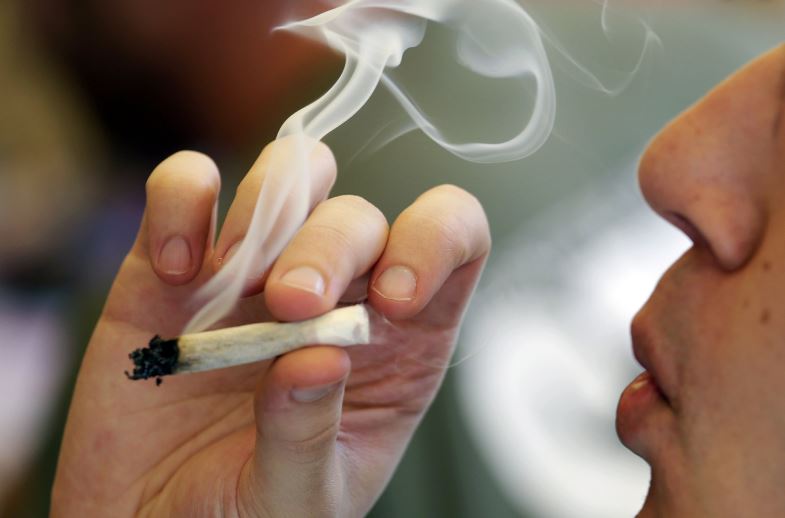
(Photo: AP)
Los Angeles (People's Daily) -- It goes by many names including pot, weed, dope and lit to mention just a few, and is consumed in joints, blunts, pipes and even brownies. Its real name is marijuana and it continues to be front and center in a national discussion as to whether it should be legalized.
According to a recent survey, 52 percent of American adults say they have tried marijuana at some point in their lives. Another poll found that around 85 percent of Americans support legalizing medical marijuana.
Former US president Bill Clinton once famously noted that as a young man he had tried it but did not inhale it.
Recreational use of marijuana was thought to have been introduced in the US in the 1930s by immigrants from Mexico. Back then, marijuana had a bad name as several research studies had linked it to crime, violence, and anti-social behavior.
It’s thought that the US temperance movement against alcohol at that time, or prohibition, also spearheaded general opposition to marijuana.
In the United States, the use and possession of cannabis is still illegal for any purpose under federal law. It is classified as a schedule 1 drug of the Controlled Substances Act. There are moral and public health reasons for it not being legalized, as well as continuing concerns over violence and crime associated with production and distribution of the drug.
In spite of the federal regulation, however, 11 states and Washington DC have legalized marijuana for recreational use, while another 33 states have legalized medical marijuana.
Pros and cons of commercial marijuana
These days, one of the arguments couched by people who support the legalization of marijuana is that it is not any more harmful to a person's health than alcohol or tobacco, which are both legal and widely used. They are also regulated by the US Food & Drug Administration (FDA).
It is also argued by many that marijuana has proven medical benefits for patients suffering from a range of ailments and diseases, including cancer, AIDS, and glaucoma. Plus, they believe that legalizing it would help reduce crime and violence associated with buying and selling it illegally.
On the other hand, there are those who are against legalizing marijuana because they suggest that long-term or abusive use of marijuana can be harmful to a person's health and well-being. They also see its use as immoral.
Still others claim that regular marijuana use can lead to the use of harder, more harmful drugs such as heroin and cocaine. And they are of the opinion that dealers who buy and sell marijuana illegally are more likely to be involved in other crimes and that society is safer with marijuana offenders behind bars.
Marijuana legal in other countries
Despite the many arguments against it, pot is legal in a host of countries in the Americas such as Canada, Belize, Jamaica, Argentina and Colombia. In Mexico, the supreme court has ruled marijuana prohibition is unconstitutional.
There are also many countries in western Europe where marijuana is either legal or decriminalized – Spain, Portugal, Belgium, the Netherlands and Italy fall into that category, as do Cambodia and Laos in Asia.
The point being that as time goes on, more and more governments at both federal and state/provincial levels are relaxing the rules when it comes to personal use of the drug and these days that’s happening at a pretty rapid clip.
Legalized pot is big business
Marijuana has become one of the best-selling agricultural products in the US. In the five years since it was legalized in Colorado in 2014, sales have totaled $6 billion and of that, the state government has earned $1 billion in tax revenue. The 11 states that have legalized the sale of recreational marijuana raked in more than $1 billion in 2018 alone in recreational pot taxes.
However, not everyone sees the benefits of it. In the Los Angeles County city of West Covina for instance, members of the council are at odds over the issue. Mayor Corey Warshaw favors it and has proposed the city could make use of disused warehouses to grow legal pot, but Chinese-American councilman Tony Wu opposes that idea saying local residents don’t want it.
And it doesn't end there. 24 California cities that restrict pot sales have sued the California Bureau of Cannabis Control, arguing that by allowing home deliveries in their city limits, the state is violating 2016’s Proposition 64, which legalized recreational marijuana. The action is in response to a regulation adopted by the agency in January of this year that permits state-licensed firms to deliver cannabis in cities that have banned pot shops.
There have been a couple of attempts in recent years to get the US Congress to pass laws to legalize, or at least, decriminalize marijuana nationally but to no avail. Bills were presented to the House in 2011 and 2013 but were rejected.
There is a widespread opinion though that in order to convince American lawmakers to change their minds on the issue there needs to be a lot more legitimate scientific research on whether marijuana is safe and really is the wonder drug that many people claim it is.


